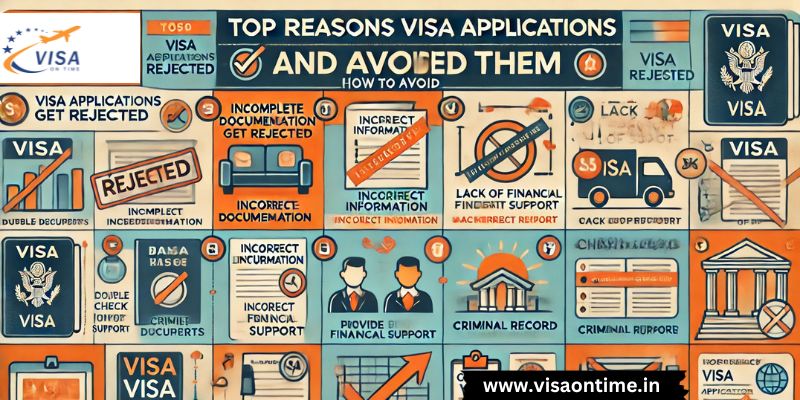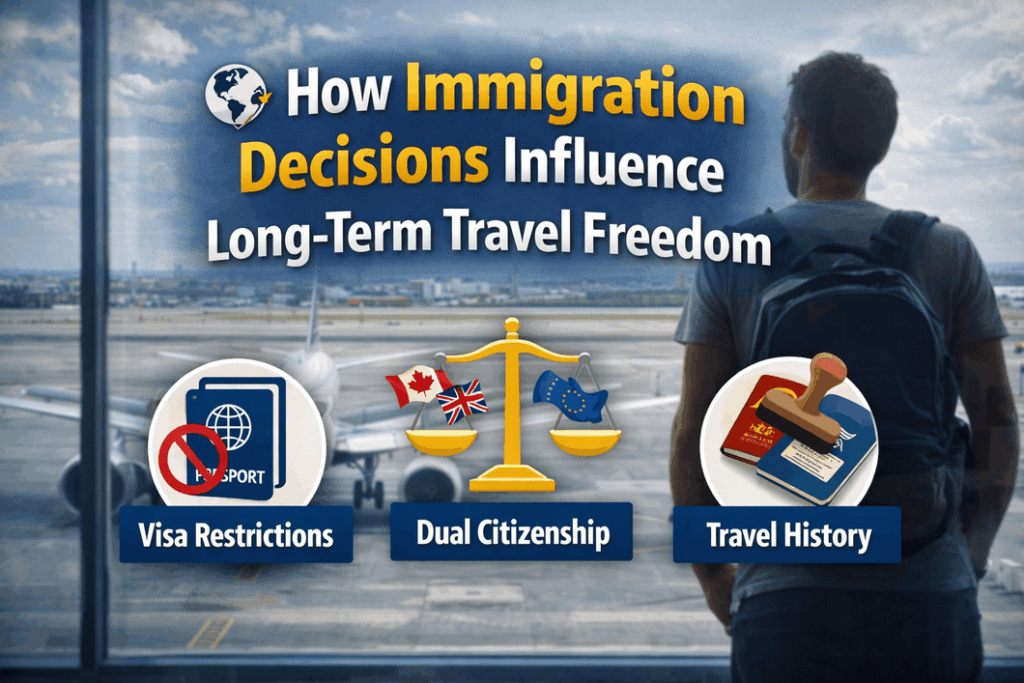Applying for a visa can be an overwhelming process, especially when it comes to ensuring all requirements are met. Whether you’re applying for an H1B visa, travel visa, eVisa, student visa, family visa, or business visa, understanding the common reasons for rejection can save you time, money, and stress. Let’s explore why visas get rejected and how to improve your chances of approval.
1. Incomplete or Incorrect Application Forms
One of the most common reasons for visa rejection is submitting an incomplete or incorrect application form. For instance, when filling out the DS-160 form for a U.S. visa, any errors or missing information can lead to delays or outright denial.
How to Avoid:
- Double-check every field on your application form.
- Ensure your information matches your supporting documents.
- Use guides or consult visa services like VFS Global for assistance.
2. Missing or Insufficient Documentation
Every visa type, whether it’s a student visa or family visa, requires specific documents. Missing even a single required document can result in rejection. Insufficient proof of financial stability, such as bank statements or sponsorship letters, is another common issue.
How to Avoid:
- Carefully read the checklist provided by the embassy or consulate.
- For an eVisa, upload clear and legible copies of your documents.
- Keep extra copies of essential documents, like passport-sized photos, travel itineraries, and financial statements.
3. Poor Financial Records
When applying for a travel visa, embassies often check if you have enough funds to cover your trip. Weak financial proof or unexplained transactions can lead to rejection. For example, an H1B visa application may be denied if the employer cannot show financial stability to sponsor you.
How to Avoid:
- Maintain consistent financial records for at least six months before applying.
- Submit clear proof of funds, such as salary slips, tax returns, or bank statements.
- For sponsored visas, include a sponsorship letter and the sponsor’s financial documents.
4. Lack of Ties to Home Country
For temporary visas like travel visas or student visas, proving that you intend to return to your home country is crucial. Lack of ties, such as property ownership, employment, or family obligations, often raises red flags.
How to Avoid:
- Provide proof of property ownership or lease agreements.
- Submit a letter from your employer confirming your return to work.
- Mention family responsibilities or ongoing commitments in your home country.
5. Criminal Records or Security Concerns
Having a criminal record or being flagged as a security risk is a common reason for visa denial. Even minor offenses can raise concerns for immigration officers.
How to Avoid:
- Be honest about your past records, as embassies conduct thorough background checks.
- Provide court documents if applicable, showing resolution of any charges.
- Seek professional advice if you are unsure how to handle your application.
6. Inconsistent Travel History
Frequent travel with unexplained stays or overstaying a visa in the past can lead to rejection. For example, while applying for a business visa or eVisa, your travel history may be scrutinized.
How to Avoid:
- Always follow visa rules during previous travels.
- Provide valid reasons for long stays in another country, supported by documentation.
- Use a cover letter to explain your travel history, if needed.
7. Inadequate Interview Preparation
Visa interviews are an important step for many visas, including the H1B visa, student visa, and family visa. Inadequate preparation or providing inconsistent answers can lead to rejection.
How to Avoid:
- Prepare thoroughly by practicing potential interview questions.
- Be honest, confident, and concise during the interview.
- Dress appropriately and carry all necessary documents in an organized manner.
8. Lack of a Clear Travel Purpose
When applying for a travel visa or business visa, not having a clear purpose for your trip can result in denial. Vague explanations or conflicting reasons may raise suspicion.
How to Avoid:
- Clearly state your purpose in the application form and supporting documents.
- For business travelers, include an invitation letter from the host company.
- For tourists, provide a detailed travel itinerary.
9. Applying for the Wrong Visa Type
Choosing the wrong visa category, such as applying for a travel visa instead of a business visa, can lead to immediate rejection. Different visa types have unique requirements, so understanding which one fits your purpose is critical.
How to Avoid:
- Research thoroughly or consult visa services like VFS Global to identify the correct visa type.
- Read embassy guidelines for your visa category.
10. Age Restrictions
Most visas have specific age restrictions. For instance, some visa categories, like a student visa, require you to fall within a certain age bracket. Similarly, only individuals aged 18 and above can apply for an eVisa or other visa categories.
How to Avoid:
- Check the age criteria for your desired visa before applying.
- Provide necessary documents proving your eligibility.
11. Weak Sponsor Details
If you’re applying for a family visa or a sponsored student visa, weak sponsor details can lead to rejection. Embassies may question the sponsor’s financial capacity or credibility.
How to Avoid:
- Provide complete and accurate sponsor details, including financial proof.
- Include a sponsorship letter explaining the relationship and purpose.
12. Ignoring Visa Validity Rules
Overstaying your visa during a previous trip can affect future applications, especially for a travel visa or business visa. Ignoring visa validity periods and conditions can damage your credibility.
How to Avoid:
- Always follow the rules of your current visa.
- Leave the host country before your visa expires.
13. Insufficient Academic Records
For a student visa, poor academic performance or insufficient proof of enrollment can lead to rejection.
How to Avoid:
- Provide clear academic records, acceptance letters, and test scores.
- Include a strong statement of purpose explaining your educational goals.
14. Ignoring the Application Timeline
Submitting your application too late can lead to rejection. Processing times vary depending on the visa type, whether it’s an H1B visa, eVisa, or family visa.
How to Avoid:
- Apply well in advance, considering the processing time mentioned by the embassy.
Final Thoughts
Applying for a visa doesn’t have to be stressful. By understanding the requirements for your visa type, whether it’s a travel visa, student visa, or business visa, and avoiding these common mistakes, you can improve your chances of approval. Use resources like VFS Global for guidance and always double-check your application before submission.
Remember, honesty, preparation, and thorough documentation are your best allies in a successful visa application process. Follow these tips to turn your dream of international travel or relocation into a reality!









